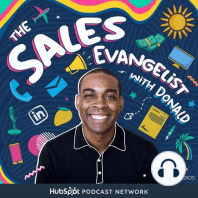8 min listen

TSE 1114: Assessing Curiosity To Optimize The Performance of Outbound Sales Reps
TSE 1114: Assessing Curiosity To Optimize The Performance of Outbound Sales Reps
ratings:
Length:
28 minutes
Released:
Jun 12, 2019
Format:
Podcast episode
Description
Asking questions and learning about the client is an accepted part of sales, but the key is assessing curiosity to optimize the performance of outbound sales reps. Alex Burg, who has a consultancy in curiosity quotient selling, focuses on leveraging mutual curiosity. He said isn’t so much the case that sellers aren’t thinking about curiosity, but rather that they are thinking about it too tactically. Learning about clients Most sales methodologies are a bit too complicated and don’t really require that much detail. Sellers don’t need to write down 27 questions before they sit down with clients. They simply need to learn enough to ask intelligent, informed questions. By demonstrating your curiosity, you built rapport much more quickly. Stephen M.R. Covey wrote a book called Speed of Trust that reports a significant correlation between the development of trust and the pace of decision making. In other words, if you really want to accelerate your sales cycle, build trust. And the fastest way to build trust is to demonstrate curiosity. Types of curiosity Alex distinguishes between social curiosity, which is about people, and technical curiosity, which is about how things work. If you’re in a transactional sales environment, you must focus on getting a decision made quickly. So too much open-ended curiosity could be detrimental. Begin by assessing what kind of sales organization and what kind of sales process you’re engaged in. You also must know what sort of clients you’re selling to. Then, assess your individuals and your organizations to determine whether you have the right characteristics to thrive in a particular sales environment. From there, you can assign or hire people based on their ability to deliver on those requirements. Assessments As an individual, a certain degree of introspection will help you determine whether sales even makes sense for you as a career. There are many assessments available that can help you determine whether you’re epistemically curious with a general thirst for knowledge or perceptually curious with a desire to solve problems and fix things. If you’re epistemically curious, you’re well suited for long sales cycles, complex selling, and larger deal size. If you’re more focused on getting it done today, you’ll benefit more from a transactional sales environment. You’ll get more satisfaction from quick decisions Leverage strengths Once we understand where people’s strengths lie, leverage this information in the sales environment and then coach your team accordingly. The most important part of the sales process is the initial discovery. That’s where you’re qualifying the prospect. The thing you have the most control over is how you spend your time. Determine whether you even have a solution that makes sense for the prospect. If we can get a little better at driving rapport and a little better at collecting information, we can reduce the sales cycle. Imagine what it would do to your bottom line if you could shorten it from 6 months to 3. Creating questions You must begin by learning enough about the client to ask intelligent questions. Your leadership must also have a mindset that encourages curiosity. Make appropriate risk-taking acceptable. Many companies will say they want to develop a curious organization, but then they don’t act that way. They focus more on mitigating risk than on allowing reasonable risk. Ask the tough questions that aren’t always comfortable. Don’t necessarily show up with a list of 15 questions. Instead, develop a list of the five most important questions and then focus your attention on those. Mindfulness Before you get on the phone with your clients, eliminate all distractions. Turn off your notifications on your phone so you can really listen to what the other person is saying. Don’t simply go through the checklist. Focus on asking better questions. Realize, too, that if you learn from situations that you view as a mistake, then they aren’t truly mistakes. They are learni
Released:
Jun 12, 2019
Format:
Podcast episode
Titles in the series (100)
TSE 000: Welcome to the Sales Evangelist Podcast! by The Sales Evangelist